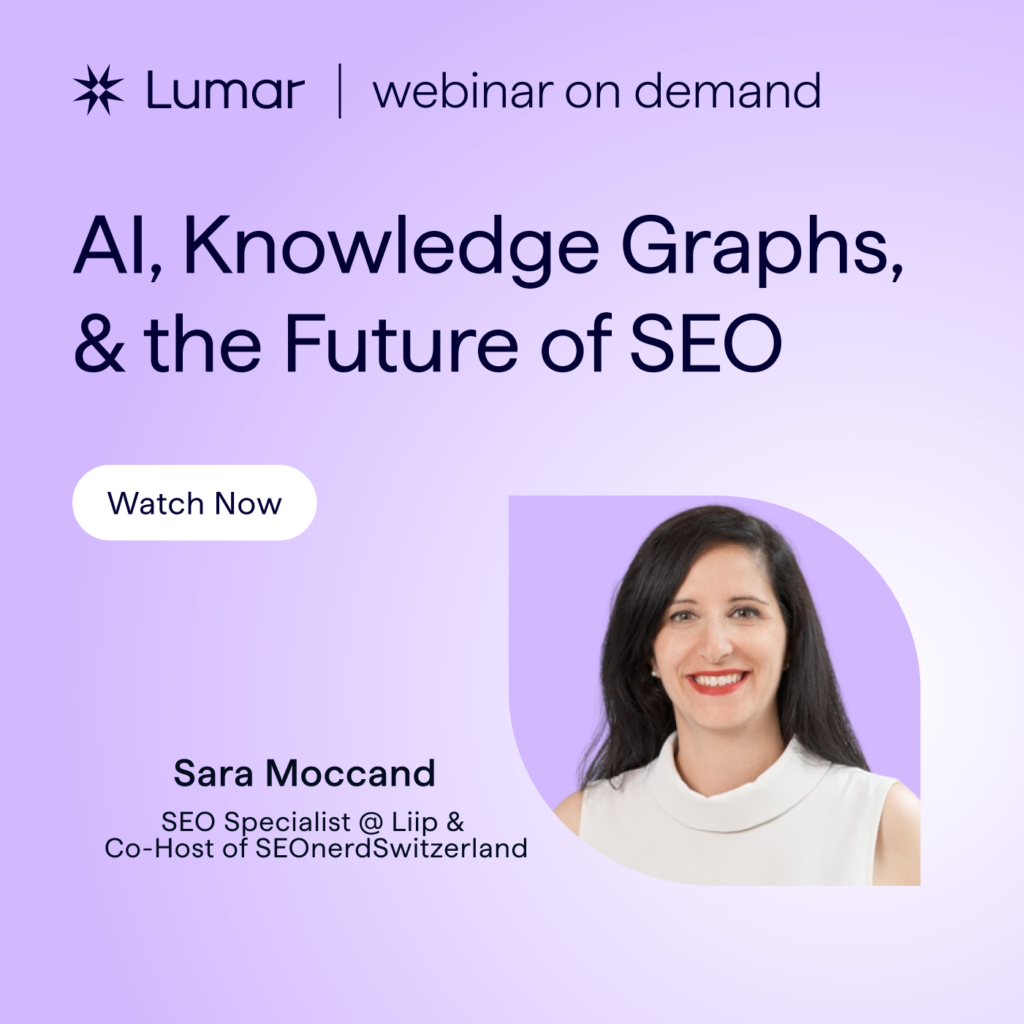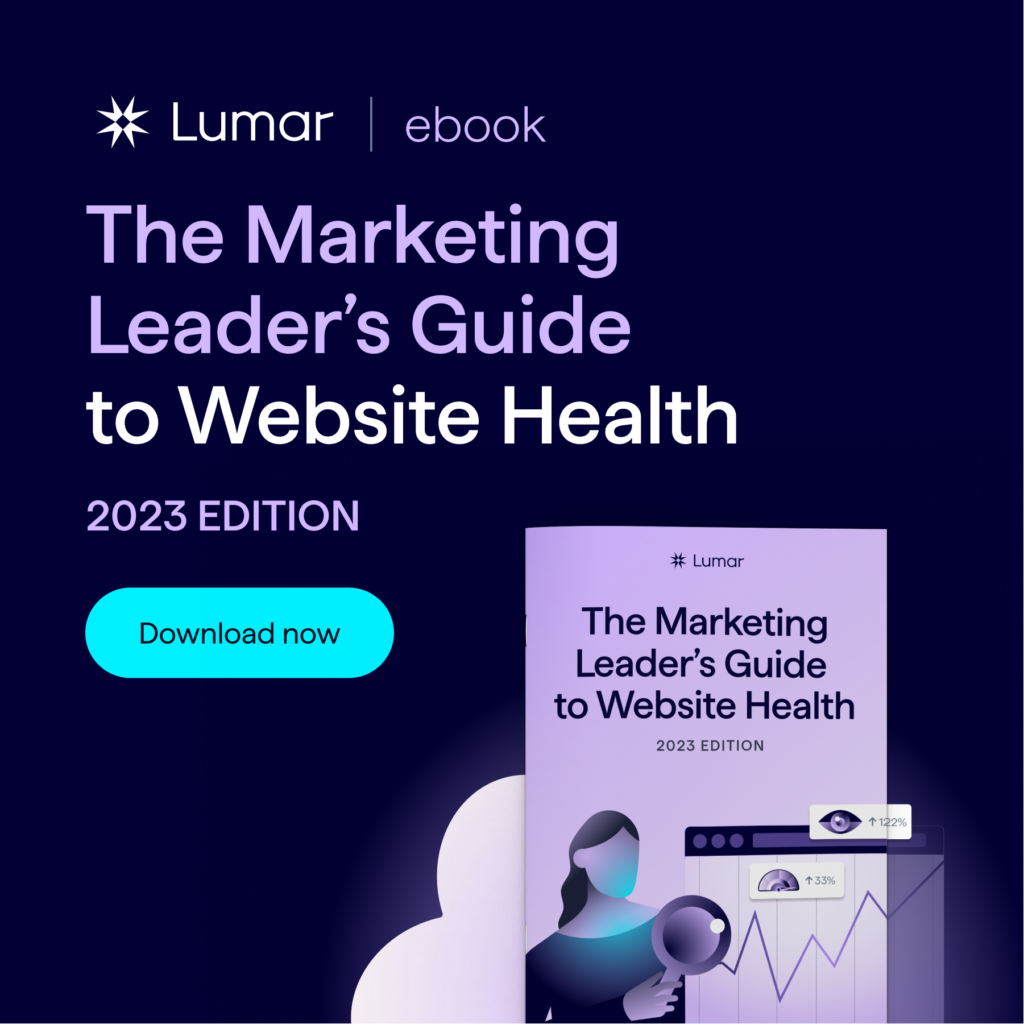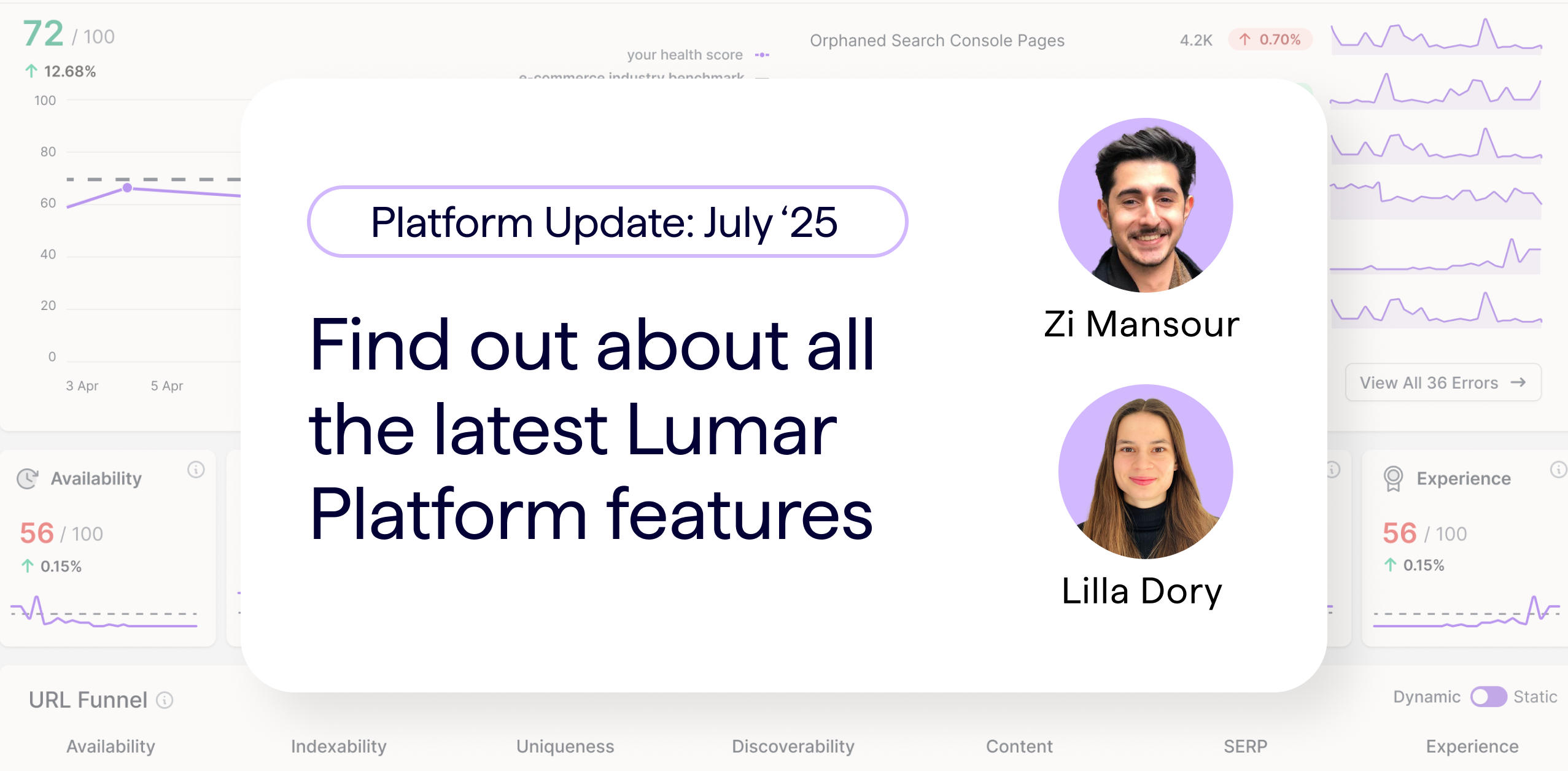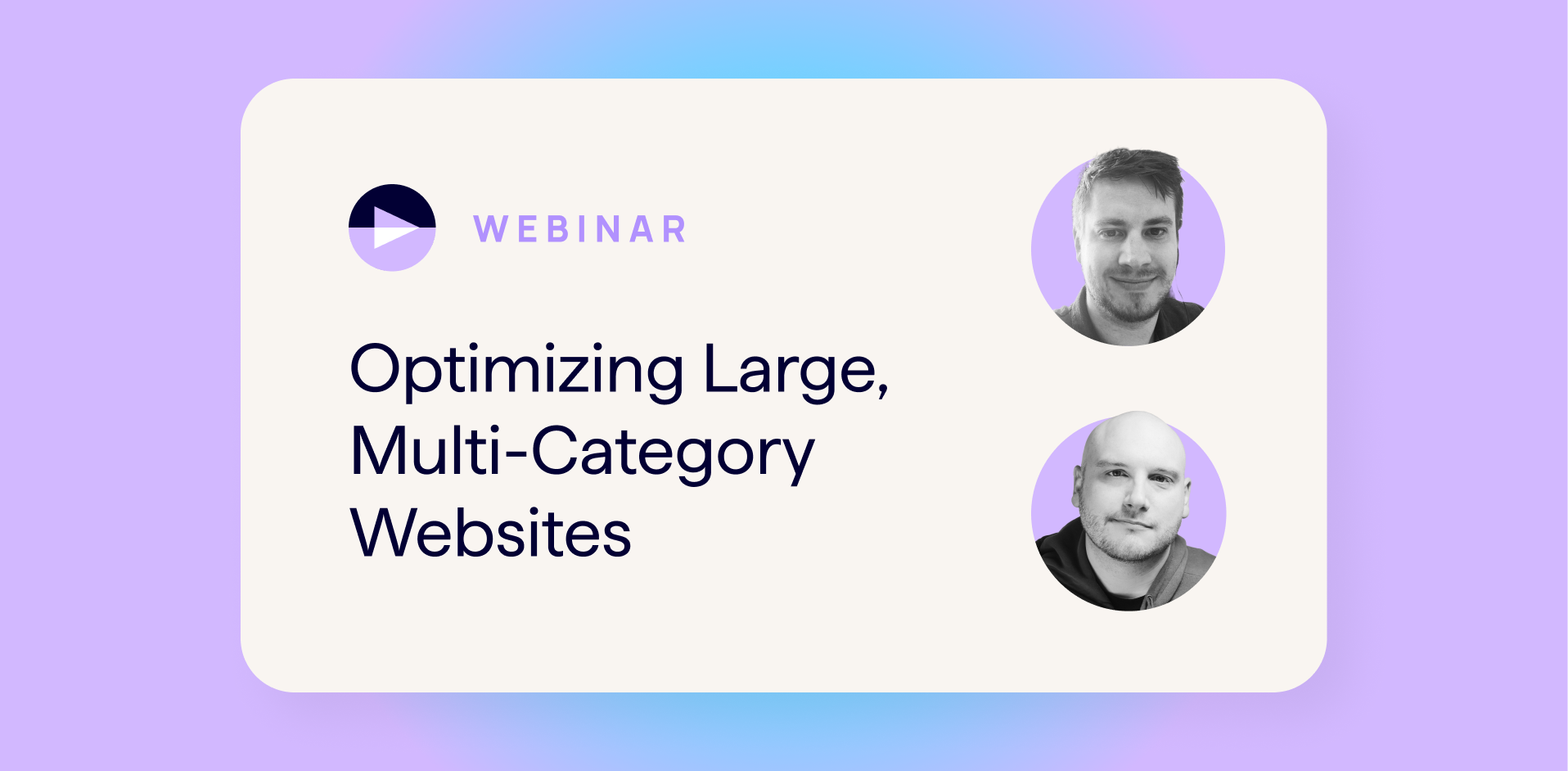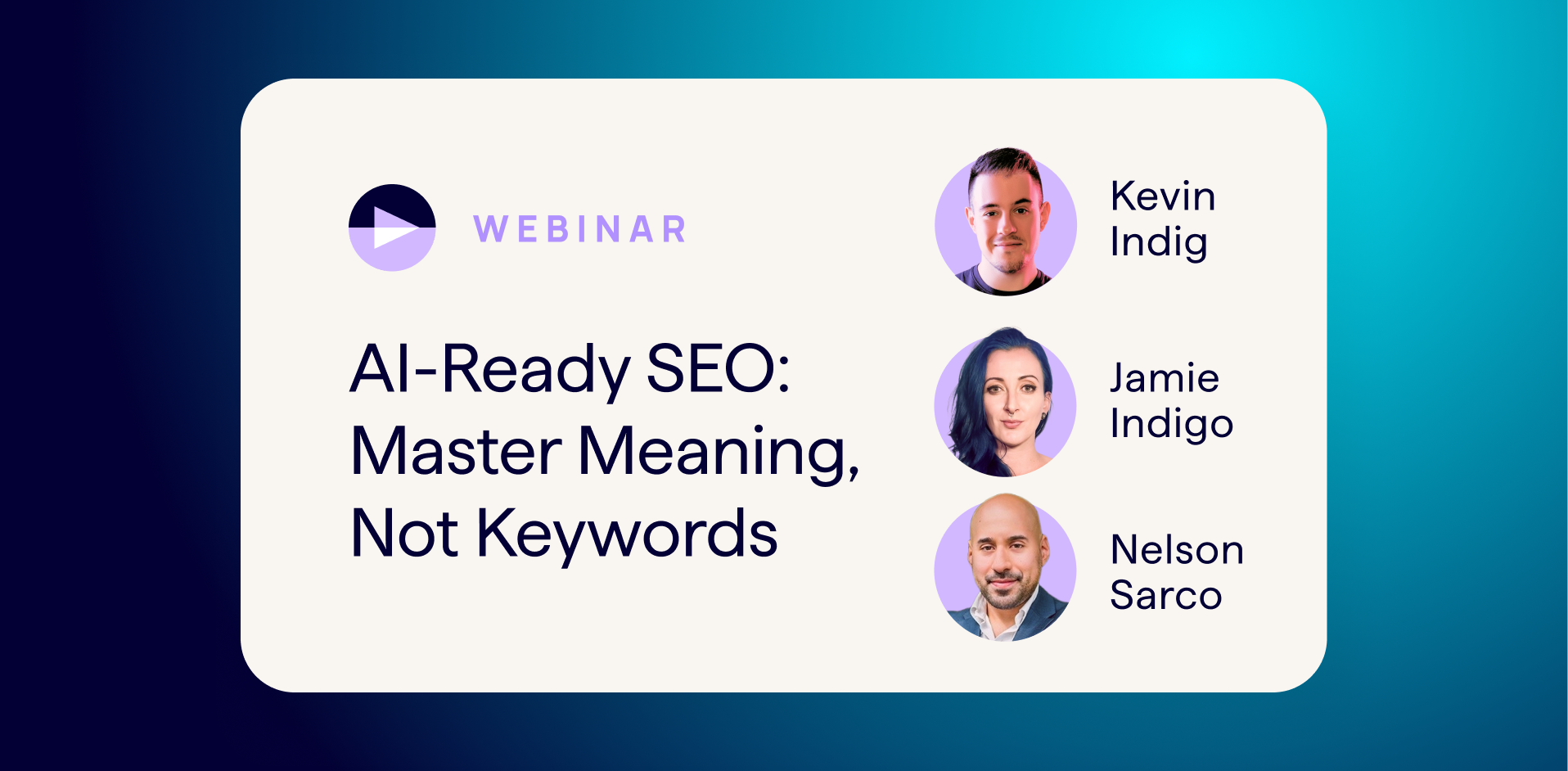Get ready to ring in the new year with Lumar’s technical SEO experts in this panel discussion of our predictions for 2024 SEO trends and best practice recommendations for the year to come.
We’ll discuss:
- The latest Google search algorithm updates & what they mean for the future of SEO
- Search engines’ war against low-quality content following the explosion of generative AI tools like ChatGPT
- The role of user experience factors like Core Web Vitals & website accessibility in SEO
- How SEOs can offload some menial tasks to AI in 2024
- … and much more!
Watch the full 2024 SEO Predictions webinar session above – including Q&A session — or read on for our top takeaways.
Key Takeaways: 2024 SEO Predictions
- Human-first content will become more important than ever in an age of generative AI tools
- Brands will need to decide whether they want to optimize for AI generative search features — or block AI bots
- SEOs can benefit from automating menial tasks (like schema markup clean-up) with ChatGPT and AI tools, but shouldn’t use AI-generated content if they want to rank well in 2024
- User experience — and website accessibility — will continue to be important considerations for SEOs in 2024.
The importance of human-first content in 2024
“If you’re not writing for a human being, a person, please stop what you’re doing and do it now,” says Chris Steele, a senior technical SEO at Lumar, “If you’re still in the phase of writing for search positioning or anything like that, then you’re kind of hustling backward at that point.”
“If the core algorithm updates and the Helpful Content Updates that we had this year didn’t convince you that content that targets people (versus [targeting SERP] positioning) matters, I don’t know what will, but definitely, this is the focus,”
Google continued developing its Helpful Content System throughout 2023 and introduced new content-focused search ranking algorithm improvements like its “Hidden Gems” update that focused on showing more content from forums, social media, and blog posts that demonstrate a high degree of first-hand experience.
This follows on its earlier update to include “Experience” in its E-E-A-T guidance, which should have signaled the importance of human-first content to SEOs long before the related algorithm updates rolled out.
“I think the interesting thing for me has been in the last couple of months,” said Lumar’s Chris Spann, “To be fair, [Google] have massively over-indexed towards Reddit and [forum content] — well, especially Reddit. We’ve seen the parasites have a field day on it. But at the end of the day, if you’ve got a very specific question, quite often Reddit is where I find the answer, right? And Reddit is where I find the answer without it being written in a 500-word blog post designed to try and rank first for a keyword, you know what I mean?”
Senior Technical SEO Natalie Stubbs added:
“I think it was one of the algorithm updates — August, September, October, take your pick… — where sites like Reddit and Quora really saw a visibility interest. I think that’s really interesting because it does show that shift towards content that is written by people with actual experience… That kind of human-side [content]. I know that Google sort of relaxed some of the phrasing that they’ve used around content that’s generated by AI and kind of moved away from being completely against it, [saying more that] as long as the content is good quality, it should still rank and be visible. But I do think it’s really interesting that obviously, [Google’s] focus on [an author] having the experience to share content that is authentic — is seemingly very important still.”
“If you’re not writing for a human being, a person, please stop what you’re doing and do it now.”
— Chris Steele, Senior Technical SEO, Lumar
It’s all about AI tools (… or is it?)
While there is a focus on human-first content for SEO in the year to come, more menial SEO and content-writing tasks may still be worth offloading onto AI tools like ChatGPT.
“I think the AI thing is interesting,” says Spann, “When I was working on travel sites, we were trying to find a way to add content to pages — human readable, content content, if you know what I mean — but what we found was, if you’ve got 50,000 hotels in your database, there’s only so many ways you can say it’s one mile from the beach. So content like that, by all means, offload onto AI.”
“AI, from my experience anyway, is useful when you use it to add to human-written things; it’s a tool more than anything else.”
The other SEOs on our panel have also found some time-savings when using ChatGPT to streamline more menial SEO tasks, like cleaning up schema markup.
“I’ve been using it for very menial tasks, things like formatting schema,” Stubbs explains, “That’s always a great one. So, if you’re working on a piece of schema and you’ve kind of got it in a huge block, I like using ChatGPT to format it; put all the indents in, etc. But I wouldn’t go as far as asking a tool like that to actually create schema for me — and maybe that’s just a lack of trust [that the tool will get it right].”
Steele adds:
“I’ve used [ChatGPT] for some things like keyword research. I’ve used it for at least framing content — not writing out whole pages, by any means — but for creating outlines. And I’ve used it for data segmentation. And it’s been really useful for that and even for some light code, some JavaScript and things like that. It’s saved me some time, but none of it has been really transformative for me; I’ve never done any of these tasks with it and thought, ‘I could not have done this without ChatGPT’. It hasn’t saved me massive amounts of time; hasn’t cut the time in half. It’s useful — it’s a tool. It can be helpful for SEOs, but I don’t think it’s ever going to replace that knowledge that you need.”
Should you optimize your site for AI search?
Brands will soon need to make decisions on whether or not they want to block generative AI bots from crawling and indexing their content for use in generative search results — or optimize for them.
“Brand awareness is a thing. For some clients, it’s just gonna be about appearing in the SERPs in as many places as you can.”
— Chris Spann, Senior Technical SEO, Lumar
Spann illustrates this decision with an example from his SEO client work:
“I have had a conversation with a client who have a paid-for product, but they produce a lot of news content and written stuff [on their site] and that’s where they get a lot of their traffic from.”
“And we had that conversation the other day, where it was like, ‘Do we just need to tell our higher-ups that yeah, we’re going to start getting fewer clicks now [because of SGE]? And is the best we can hope for to try and appear in that little carousel on the side of SGE where it says, ‘answers taken from these sources’? Do we just try to appear in that now?”
“But then we also have clients that say, ‘Well, we want to block ChatGPT [and AI bots] entirely in robots.txt. And it’s going to be interesting. One of those sides is gonna win. And I’m not sure which.”
“Brand awareness is a thing. For some clients, it’s just gonna be about appearing in the SERPs in as many places as you can.”
Steele shares that he tends to err on the side of optimizing for AI search for the purpose of expanding brand awareness efforts rather than blocking AI bots.
“That’s the side I tend to fall on,” Steele says, “Because you’re right, SGE is going to serve up answers that don’t require a click-through response anymore. But at the end of the day, it does also cite its sources. So if you’re creating the most compelling content or subject matter information about a certain topic or about your product, [SGE] still has to cite where it comes from. And if you’re selling a paid-for product, a buying action still has to be taken at some point.”
Stubbs suggests it may be too soon to go all-in on optimizing for AI search, however:
“Obviously, Bing and Google have kind of been going at it for a while now, both really focusing on AI and building out their systems and that technology. Bing is arguably a lot further ahead than Google is. And it shows in various tests that people have done comparing SGE and Bing Bot ,” she says.
“But Bing’s publishing these metrics saying, you know, ‘We’ve hit a hundred-million users this month’ — which I think was a few months ago. But when you actually zoom out of that, it’s not taking anything away from Google’s market share whatsoever [at the moment]. So I just think it is too early to really be focusing [on AI search] or honing in on saying, ‘Okay, I need to optimize my site for AI search and for all these new features that arebe gonna be appearing in search.’ Do you want to put all your eggs in that basket right now? I’m not totally convinced.”
UX, web accessibility, and SEO
Google and other search engines want to show their users good-quality websites a the top of their search results. This expands beyond just content quality — it also includes user experience.
This is illustrated by Google’s introduction of Core Web Vitals — UX-related metrics — into their search ranking algorithm a few years back.
SEO in 2024 needs to focus on overall website quality. As Stubbs says:
“It’s all about the ability to zoom out and take a more holistic view of what we do as SEOs. I think gone are the days when you would have a UX team or a CRO team and an SEO team all working in siloes. It feels like it’s more important than ever that everybody [working on the website] has got the ability to zoom out and make sure that you are working as one and working toward the same goals.”
Lumar’s solutions engineer Matt Hill has discussed this holistic view of SEO before, in his article on why SEOs need to understand website accessibility.
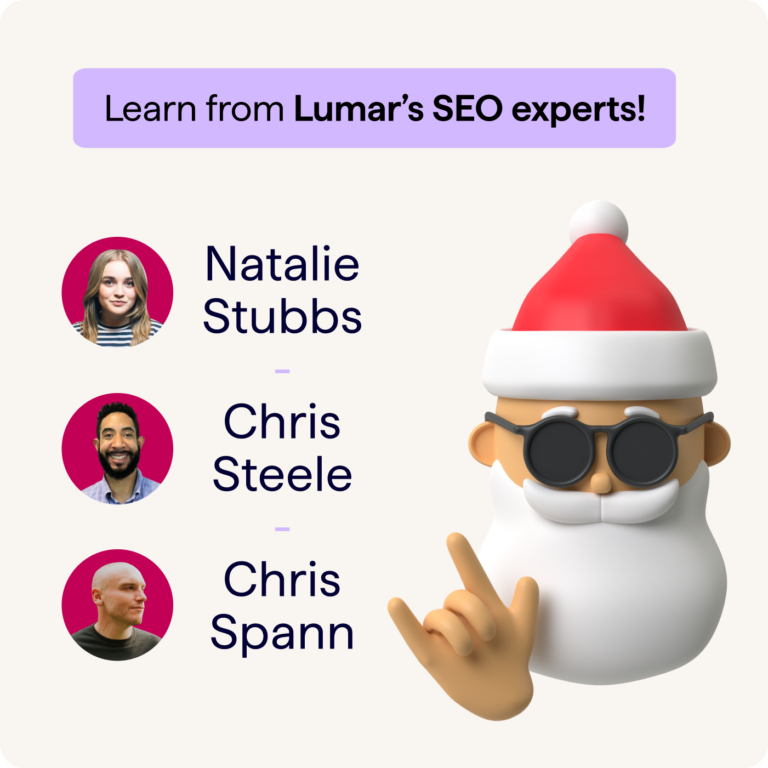
Meet the SEO Panel
- Chris Spann – Senior Technical SEO, Lumar
- Natalie Stubbs – Senior Technical SEO, Lumar
- Chris Steele – Senior Technical SEO, Lumar
Don’t miss the next Lumar webinar!
Sign up for our newsletter below to get alerted about upcoming webinars, or give us a follow on LinkedIn or Twitter/X.
Want even more on-demand SEO webinars? Explore the full library of Lumar SEO webinar content.


